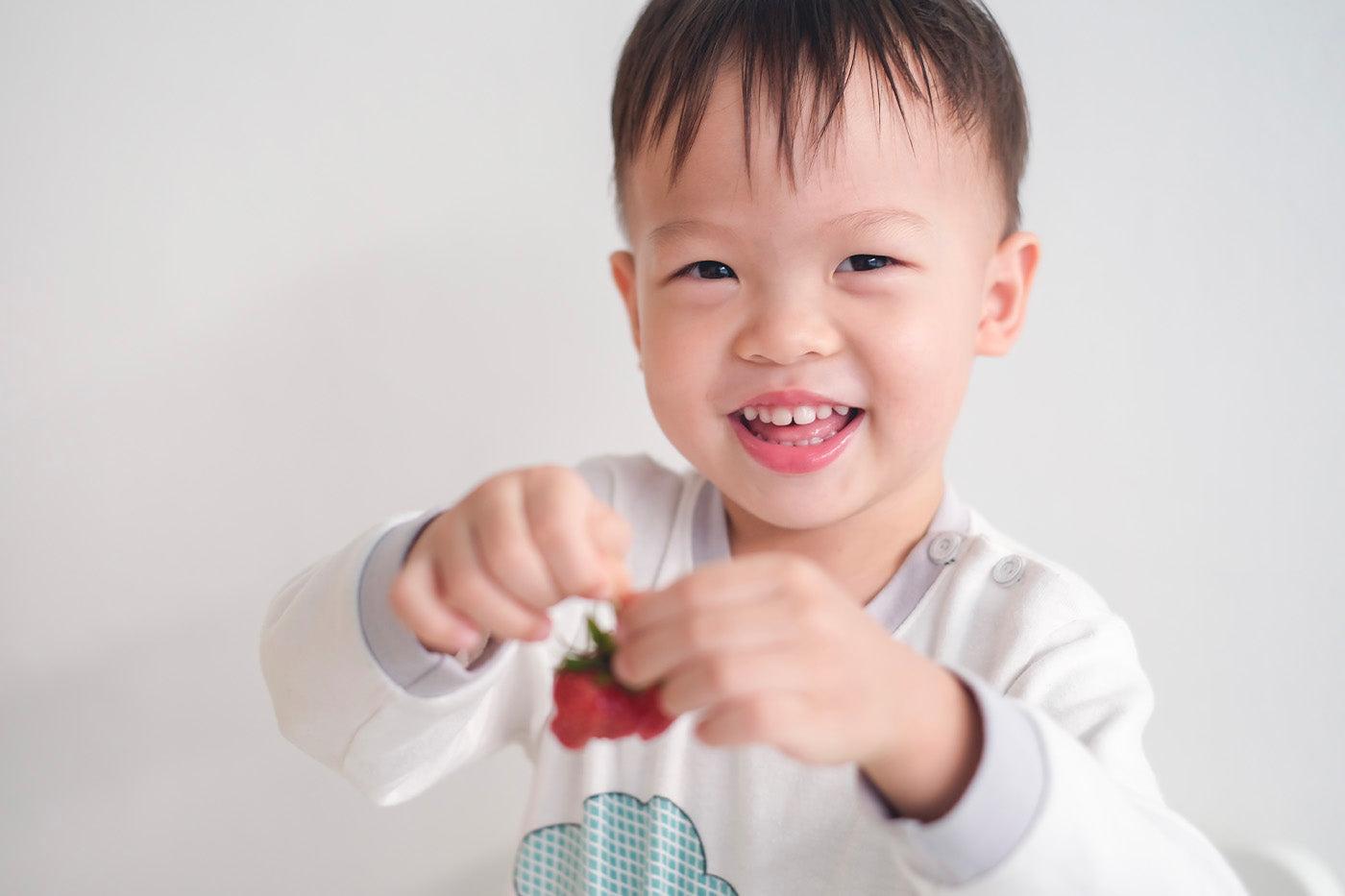TODDLER
What’s Your Toddler’s Temperament Type?
You’ll find parenting makes a lot more sense when you figure out your toddler’s unique temperament.

Written by
Dr. Harvey Karp

If you’ve ever been on a toddler playdate, gone to a parent-and-me class, or even just visited a playground, you’ve noticed that toddler personalities can vary…a lot! And, of course, that’s normal! No two toddlers are alike. However, there are three main temperament buckets that all toddlers fall into. Knowing which one best fits your little one will help you better predict whether your child will greet certain situations with gusto or caution…and it’ll help you better navigate parenting, too.
What is toddler temperament?
Each child is born with a personality as unique as their fingerprints. It’s a mixture of intelligence, humor, and a fascinating quality called temperament. Your tot’s temperament is their style of interacting with the world. Their own personal pacing, their attitude, flexibility, and general mood. Is your toddler cautious or a brave little bug? Stubborn or easygoing? Mild mannered or super passionate? Temperament explains why some of us can easily sleep with the TV on, while others stir with the tiniest noise. It’s why some of us forgive easily and others just can’t let go. Knowing your child’s temperament helps you know when to pamper your tot…and when to push them.
Is toddler temperament hereditary?
Temperament tends to pass from parent to child. So, slow-to-warm parents often have more apprehensive kids…and passionate parents often have little firecrackers. But sometimes nature throws a curveball and a pair of quiet-loving librarians can spawn the next heavy metal rocker.
Easy Toddler Temperament
In my experience as a pediatrician, I estimate that about half of all kids are easygoing. Easygoing toddlers generally wake up cheerful and ready for the day ahead. These tots are definitely active, but they’re not wild. When push comes to shove, they’re perfectly capable of both pushing and shoving! They tolerate changes well, and thoroughly enjoy encountering new people and diving into new situations. (These are the kids who barely say good-bye at kindergarten drop off!) Their eating and sleeping patterns are blissfully predictable. Children with this type of temperament are resilient, meaning they’re excellent at bouncing back from setbacks and disappointments…and trying again with a smile.
Traits of an Easy Toddler Temperament
- Active
- Focused
- Predictable eating and sleeping habits
- Interested in meeting new people
- Easily handles unexpected change
- Mild intensity of feelings
- Typically happy or easygoing
- Okay with not getting their way
- Not sensitive to noises or smells
Shy Toddler Temperament
If your toddler is generally happy, but cautious and slow to warm up to new people and experiences, they’ve got a shy or slow-to-warm temperament. Your toddler may frown and cling to you for safety when a friendly stranger waves. They may love quiet play and tend to be very observant. (Yours is the kid who recognizes that they’re going to the doctor’s office—and starts to cry—blocks before you get there!) Slow-to-warm children are often early talkers, late walkers, and they lean toward the sensitive, bristling when their milk is too cold, or their sweater is too scratchy. Your child’s motto: When in doubt…don’t! These sensitive souls often start the “terrible twos” between 15 and 18 months, but if you treat your tot with patience and respect, they’ll finish the toddler years happy and confident!
Traits of a Shy Toddler Temperament
- Enjoys quiet play
- Very focused
- Predictable eating and sleeping habits
- Reluctant when meeting new people
- Unhappily handles unexpected changes
- Intensity of feelings can be mild or spirited
- Happy, but easily thrown off balance
- May give up or be tenacious
- Super-sensitive to noises or smells
A Note About the Word “Shy”
Compliments and kind remarks live long in our minds…and toddlers are no different. So, replace “mean” labels that can tear your toddler down with descriptions that build them up. It’s one of the best gifts you can give. While I sometimes use the term “shy temperament” when I talk to parents, I avoid using that description when talking to children. Instead, shoot for words and phrases like “careful,” “thoughtful,” “looks before they leap,” “not feeling really talkative right now.” PS: You never need to apologize for your child! It’s simply their temperament.
Spirited Toddler Temperament
Strong-willed, spirited tykes are kind of like “roller-coaster kids,” with lots of high highs and low lows. (Expect unpredictable eating and sleeping patterns.) They’re more active, more impatient, more impulsive, more defiant, more rigid, more intense, and more sensitive than most. Because of this, when the sparks of daily stress mix with their explosive personalities…there could be a big ol KABOOM! The good news? These fidgety, distracted kiddos are bursting with grit and often grow into happy, enthusiastic kids—if they get lots of outside play, consistent—but flexible—limits, and a steady stream of patience and love.
Traits of a Spirited Toddler
- Fidgets a lot and is very active
- Easily distracted
- Unpredictable eating and sleeping patterns
- Either delighted by meeting new people or rejects them
- May handle change well or get very upset
- Passionate feelings
- Mood has big ups and downs
- Doesn’t give up
- Either not sensitive to noises/smells or very sensitive to noises/smells
How to Figure Out Your Toddler’s Temperament
If you’re not quite sure which temperament best describes your child, here’s a quick test to find out: Go to an uncrowded shopping center and briefly let your tot’s hand go, pretending to turn your back for two seconds. (All the while, keep watch out of the corner of your eye.)
- IF your toddler simply stands there…they likely have an easy disposition.
- IF your toddler tugs at your coat and cries…they likely have a shy temperament
- IF your kiddo makes a run for it without so much as a head-turn…you’ve got a spirited tot on your hands!
No matter what your child’s temperament, once you have a better sense of what makes your little one tick—and what may be hindering good behavior—you can better address the day-to-day challenges of toddlerdom.
What if your temperaments clashes with your child’s?
Few of us mesh perfectly with our children. Unlike with partners, opposites don’t always attract! Do any of the following describe how you match up with your toddler?
- I’m neat and disciplined…and my child is a little pigpen!
- I love to cuddle…and my toddler pushes me away when I go in for a hug.
- I’m athletic…and my tot is low energy and would rather read.
- I’m the life of the party…and my toddler is timid and cries around strangers.
- I’m soft-spoken…and my tot is defiant and full of opinions!
While it’s true that we usually have the easiest time getting along with children who are similar to us…that’s not always the case! For example, stubborn parents with stubborn kids can be an explosive mix. The key to getting along with a toddler whose temperament clashes with yours is to look for all the ways your respective personalities complement each other and where you collide…and then planning ahead. Half the challenge in parenting—and all close personal relationships—is being able to manage your personality clashes. And you can read more about parent-child temperament clashes here!
Once you’ve sorted out your similarities and differences, you’ll be better equipped to manage life together.
Toddler Temperament: What It All Means
Got one spirited kiddo and another who’s slow-to-warm? Great! Variety is the spice of life—and the foundation of society! After all, it would be terrible if there were no doctors in the world, but it would also be terrible if everyone were a doctor. In the end, we need leaders and followers, thinkers and doers, worriers and risk-takers. Different temperaments help fill all the niches of society. So, although you may unexpectedly find yourself with the tough job of raising a saber-toothed tiger, remember that someday your little tiger will have an important role to play in the world.
For more advice about eliminating tantrums and raising patient, respectful, and cooperative toddlers, check out my best-selling book, The Happiest Toddler on the Block.
Disclaimer: The information on our site is NOT medical advice for any specific person or condition. It is only meant as general information. If you have any medical questions and concerns about your child or yourself, please contact your health provider.
SHARE THIS ARTICLE
MOST LOVED
Sleepytime Sidekicks












